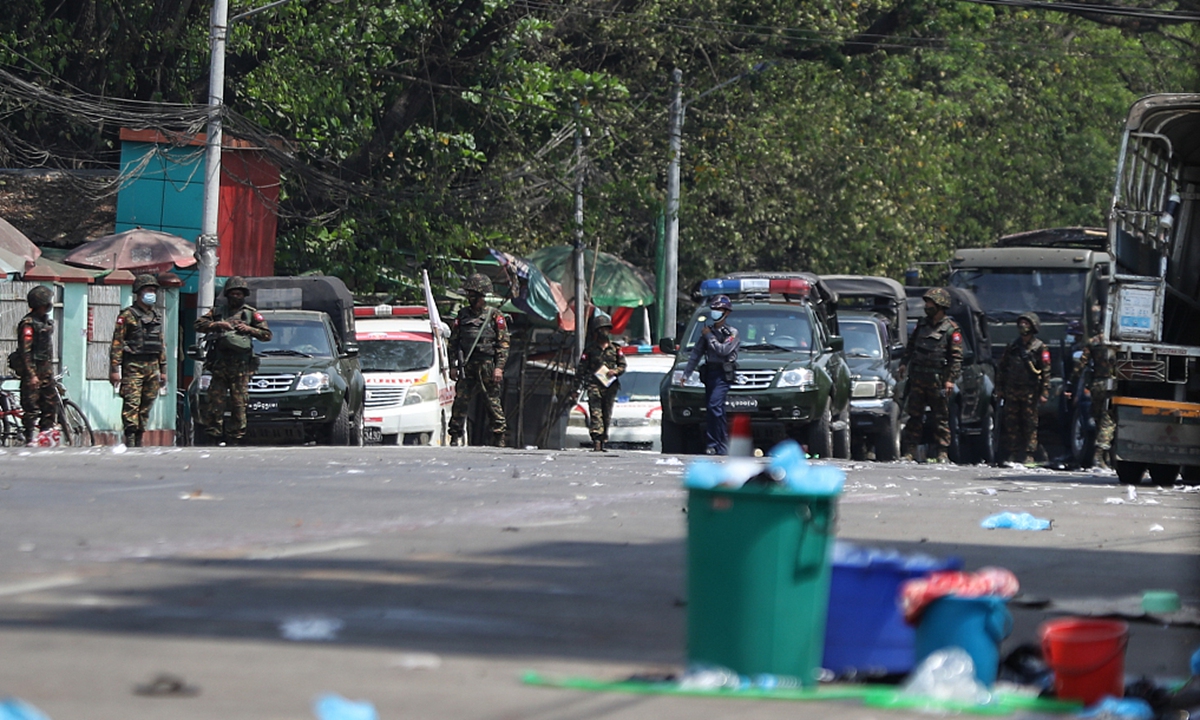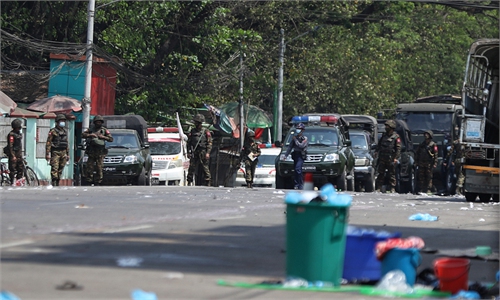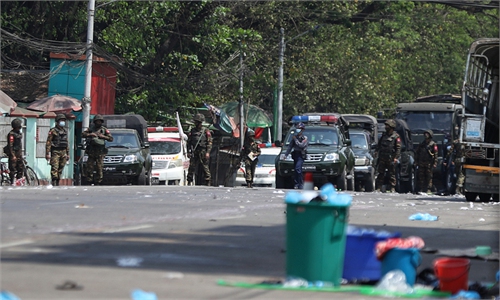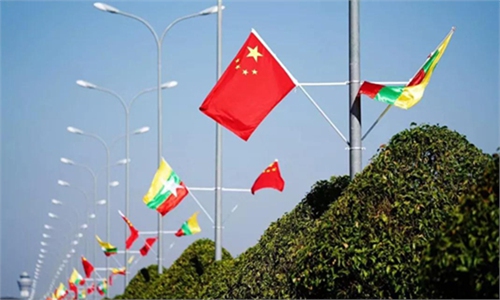Myanmar locals urged not to be incited by West as 32 Chinese factories in Yangon suffer from attacks

Myanmar Photo:VCG
A total of 32 Chinese-invested factories have been vandalized in attacks in Yangon, Myanmar, with property losses reaching 240 million yuan ($36.89 million), the Chinese Embassy in Myanmar told the Global Times on Monday, after perpetrators in Yangon smashed, looted and burnt Chinese factories on Sunday.
Two Chinese employees were injured in the attacks with no fatalities, the embassy said.
Chinese Foreign Ministry reiterated on Monday that the vandalism against Chinese enterprises was very "bad," urging Myanmar to take concrete measures to stop all violent activities and punish the perpetrators in accordance with the law to ensure the safety of Chinese employees and enterprises.
Myanmar has dispatched additional police and firefighters to the affected areas in Yangon to strengthen security, said Chinese Foreign Ministry spokesperson Zhao Lijian at a press conference on Monday.
When asked about whether China will evacuate nationals in Myanmar, Zhao said China is closely monitoring the situation and very concerned about the safety of Chinese institutions and personnel. China hopes Myanmar will take measures to protect their safety, he said.
Zhao said China-Myanmar economic and trade cooperation is always based on the principle of mutual benefit and is conducive to Myanmar's economic and social development and benefits local people.
"The actions of these lawbreakers do not serve the interests of Myanmar and its people. We call on the people of Myanmar to express their demands in accordance with the law and refrain from being incited or exploited so as to avoid damaging friendly cooperation between China and Myanmar," Zhao said.
Chinese residents in Myanmar and analysts believed that the attacks against Chinese factories were organized and premeditated, which revealed that hostile forces in and outside Myanmar aim to stoke hatred in order to distance Myanmar from China.
One day after the attacks, roads from downtown Yangon to Hlaing Thar Yar, one of the two townships where the factories were located, were partially paralyzed, with ash, small fires and roadblocks frequently seen.
Some Chinese businessmen in Yangon planned to suspend their business operations; some moved to downtown areas while others chose to stay to protect their businesses.
Lu Tong, a Chinese citizen in Yangon, told the Global Times on Monday that he stayed in the Hlaing Thar Yar industrial zone on Monday morning and did not dare go outside fearing Sunday's clashes, but so far there was no heavy smoke or gunshot after martial law was imposed in the region.
He said that the Myanmar military has taken control of the industrial zone, but did not send troops to protect specific Chinese factories.
Myanmar's junta declared "full martial law" late on Sunday in parts of Yangon after Chinese factories were damaged, Bloomberg reported.
The martial law order applies to the Hlaing Thar Yar and Shwe Pyi Thar townships. Military operations were exercised "to ensure safety, the rule of law and peace more effectively," according to Bloomberg.
A Yangon-based Chinese employee, who requested anonymity, told the Global Times on Monday that many labor-intensive Chinese companies in the city are now planning to join together to protect themselves and temporarily shut down their businesses.
A Chinese resident surnamed Yang who owns two hotels and one company in the Hlaing Thar Yar industrial zone said all of his businesses were smashed on Sunday.
He did not feel safer after Myanmar soldiers came to the industrial zone as he said that some knife-wielding people showed up near one of his hotels on Monday noon, causing great pressure to his colleagues, before they started to loot again.
"It resulted in great economic losses and psychological trauma for us, and I hope the related departments severely punish the perpetrators," Yang said.
In some Chinese factories, local Myanmar employees worked alongside Chinese colleagues to protect their businesses.
Khin Hsu Lin, a Myanmar employee of a Chinese clothing company told the Global Times on Monday that she felt much safer as some 300 to 500 soldiers arrived at the industrial zone, although no soldiers were sent to protect each Chinese factory.
Thus, employees have to protect factories all by themselves. Khin Hsu Lin said that she and several Chinese workers prepared fire extinguishers and moved flammable items to a safer place.
Sunday's vandalism mostly targeted companies in the Shwe Lin Ban Industrial Zone, Hlaing Thar Yar Township, and most were clothing factories.
The Chinese invested-projects under the Belt and Road Initiative were untouched, but representatives said they have upped the level of vigilance and are considering organizing self-protection, the Global Times learned.
Not just in the two townships, Sunday was called "one of the deadliest days" of protests in Myanmar since the military seized control, Western media reported. According to CNN, 38 people were killed in Myanmar during Sunday's protests in various regions.
Anti-China sentiment
The perpetrators who attacked Chinese factories were possibly anti-China locals who have been provoked by some Western anti-China forces, NGOs and Hong Kong secessionists, sources in Myanmar told the Global Times.
"The Chinese companies in Myanmar helped develop the local economy, solve employment issues and improve local government revenue, and also participated in lots of charity work. If the local government fails to timely deal with such an incident and protect the development of foreign enterprises, who would want to invest in Myanmar?" Yang said.
Bi Shihong, a professor at the Center for China's Neighbor Diplomacy Studies and School of International Studies at Yunnan University, told the Global Times on Monday that Sunday's vandalism which was a precise attack against multiple Chinese factories, was clearly organized and premeditated.
"Those Myanmar people who participated in the attacks were actually cannon fodder, and they were being incited and used," Bi said.
He said that behind the growing anti-China sentiment in Myanmar was the anti-China forces in the West, which have been creating obstacles for exchanges between China and other countries for a long time.
The Global Times discovered that on Friday, two days before the attacks targeting Chinese enterprises, Kyaw Win, the founder of a London-headquartered NGO in Myanmar named "Burma Human Rights Network (BHRN)," released a tweet on Friday warning that "If one civilian dies, one Chinese factory becomes ash."
Bi warned that there were many organizations like the BHRN in the West which could use every opportunity they get to attack China.
Some hostile forces in Myanmar, forcibly exploiting the local people's protests, attempted to connect the Myanmar military's actions and Myanmar's domestic affairs with China to compound their interests, with local Myanmar people also being incited by them, Bi said.
The anti-China sentiment in Myanmar has hurt normal Chinese residents and economic activities, which will force some Chinese enterprises to rethink the investment environment in Myanmar, Bi said.



